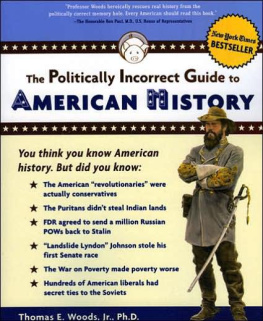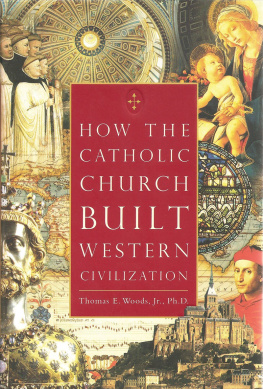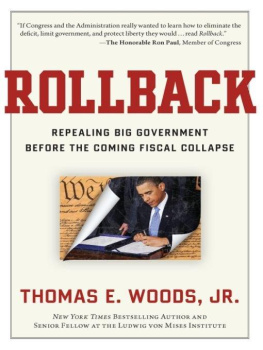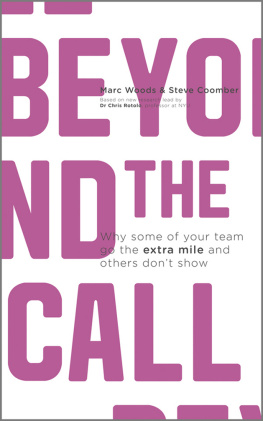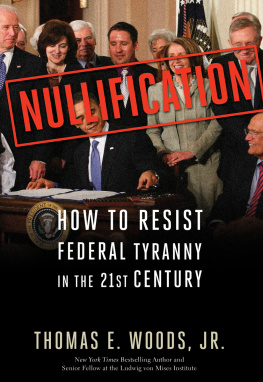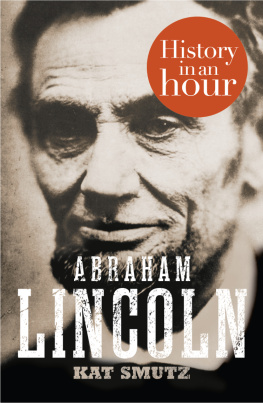Table of Contents
Praise forThe Politically Incorrect Guide toAMERICAN HISTORY
Knowing our past is essential if we are to preserve our freedoms. Professor Woodss work heroically rescues real history from the politically correct memory hole. Every American should read this book.
The Honorable Ron Paul, M.D., U.S. House of Representatives
An important work that refutes the misinterpretations of American history that have misinformed generations about their country, its origins, purposes, successes and failures. Riveting, highly readable.
Paul Craig Roberts, former assistant secretary of the U.S. Treasury
Solidly based in the best and most recent scholarship and written in an agreeable, flowing style, The Politically Incorrect Guide to American History is a gem. It will be treasured by history buffs and by anyone who suspects that high school and college textbooks might not have told the whole story.
Ralph Raico, professor of history, Buffalo State College
The history of America as taught in high school and college textbooks is often as distorted as the histories imposed on the hapless people of the former Soviet Union. Professor Woodss book should be required reading for college students. If it were, we might hope to recover something of the decentralized polity of the Founders.
Donald W. Livingston, professor of philosophy, Emory University
Not long ago American historians considered it their pleasure and duty to engage in lively and stimulating debate about the big issues of our historythe meaning of the Constitution, the causes of the Civil War, the good and bad of capitalism, the responsibility for World War I and the Cold War, and so on. But since the descent of the Iron Curtain of political correctness, what has come from the pens of our historians has frequently had more to do with theory than with evidence, with enforcing predetermined orthodoxy rather than with debate. In this book, Thomas Woods has taken on some of the big historical issues with a fresh and definitely non-PC approach. His take on American history is bold, brilliant, thought-provoking, and what is even better, entertaining. Woods has almost restored my hope for the future of historical discourse.
Clyde N. Wilson, professor of history, University of South Carolina
To my mother
PREFACE
Will Rogers once said that the problem in America isnt so much what people dont know; the problem is what people think they know that just aint so.
Nowhere is the great humorists observation more apt than in the field of American history. The story of American history that most students have encountered for at least the past several decades amounts to a series of drearily predictable clichs: the Civil War was all about slavery, antitrust law saved us from wicked big business, Franklin Roosevelt got us out of the Depression, and so on. From the colonial settlements through the presidency of Bill Clinton, this book, in its brief compass, aims to set the record straight.
A word on what this book is not. It is not, and is not intended to be, a complete overview of American history. Readers interested in studying a given issue in greater detail may wish to consult the selected bibliography, which I have included both in order to acknowledge my intellectual debts as well as to provide a list of sources on which the reader looking for the truth about American history can safely rely. (Needless to say, I do not necessarily endorse every contention made in all the books listed there; if a book appears in the bibliography I simply mean to acknowledge that I benefited from it in some way and that I believe others will, too.) Some of the books listed are unfortunately out of print, but virtually all of them are potentially available to the interested reader, thanks to electronic clearinghouses of used books like bookfinder.com.
Instead of a systematic narrative, therefore, this book is intended to be an introduction to some of the more controversial aspects of American history, and is aimed in particular at those who find the standard narrative or the typical textbook unpersuasive or ideologically biased. Some readers may find that an issue in which they have a particular interest is treated only in brief or perhaps not at all, but some kind of discrimination has been necessary for a project of this length. I am hopeful that readers will find what I have written here to be interesting, challenging, and a refreshing alternative to the stale and predictable platitudes of mainstream texts.
I wish to thank the Foundation for Economic Education in Irvingtonon-Hudson, New York, for granting permission to use portions of articles I wrote for Ideas on Liberty (recently renamed The Freeman once again); they include The Myth of Wartime Prosperity, The Colonial Origins of American Liberty, The Economics of Infantilism, Race, Inequality and the Market, and Nullification: The Jeffersonian Brake on Government.
Over the course of writing the book I received useful suggestions from Thomas DiLorenzo, Ralph Raico, and Marcus Epstein, and I am especially indebted to Professor Clyde Wilson, editor of the Papers of John C. Calhoun and professor of history at the University of South Carolina, for vetting chapter five of the manuscript. Thanks are due also to the always helpful (and never complaining) Doreen Munna, Marilyn Ventiere, and Dolores Perillo of my colleges interlibrary loan department. I also wish to thank my fine editors at RegneryRowena Itchon, with whom I worked most closely, and Paula Deckerfor their hard work and helpful suggestions.
Other debts are more personal. I am particularly grateful to Regnerys executive editor, Harry Crocker III, for approaching me with the idea for the project. Finally, I wish as always to thank Heather, my wife, to whom I am indebted more than words can express.
Thomas E. Woods, Jr.
Coram, New York
October 2004
Chapter 1
THE COLONIAL ORIGINS OF AMERICAN LIBERTY
First basic fact: the colonists were not paragons of diversity. The vast bulk of them came from one part of Europe, spoke a common language, and worshiped the same God.
Colonial historian David Hackett Fischer refers to four major waves of British migration that proved especially influential in forming American culture. Heres the timeline:
| c. 1629 to 1640 | The Puritans settled in Massachusetts Bay |
| c. 1642 to 1675 | A few aristocrats and a large number of indentured servants from the south of England settled in Virginia |
| c. 1675 to 1725 | English from the North Midlands and Wales settled in the Delaware Valley |
| c. 1718 to 1775 | Immigrants from the borders of Yorkshire, Scotland, and Northern Ireland moved inland to the Appalachian backcountry |
Guess what?
The thirteen colonies were anything but a Perfect Union.
The Puritans didnt steal their lands from the Indians.
Christianity was the most important factor shaping the colonists.

